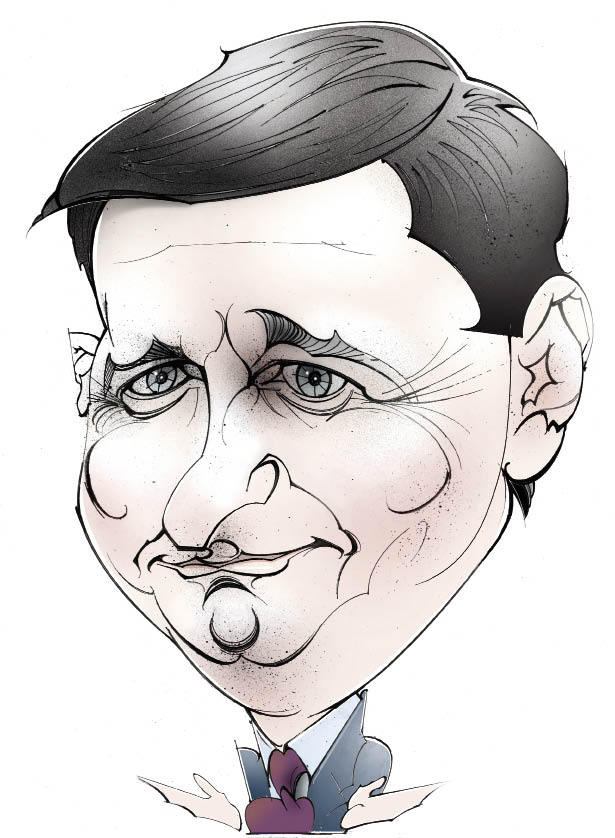Brown’s former disciple is now trying, very gingerly, to reconcile Labour with Blairism
Douglas Alexander is a politician who has risen without a trace. He is now shadow foreign secretary, the third most senior member of the shadow cabinet. He has spent his career in the service of bigger beasts, first Gordon Brown and then David Miliband, so few know who he is or what he stands for. Now, at age 43, he is determined to make himself heard. As he tells me when we meet in his Commons office, ‘One of the vanishingly few consolations of opposition is having a more public voice for what I believe and where I think we need to go as a party and as a country.’
Alexander’s office resembles a psychoanalyst’s consulting room. It is dark, with a shelfload of earnest-looking books above his desk and there are two comfy black chairs that you sink into.
The impression of being in an analyst’s room is heightened once the interview gets under way. Alexander, it is clear, wants to commit political patricide and bury the Brownite approach to politics.
For years, Alexander was Brown’s mini-me. A son of the manse and a star of Edinburgh university, he went to work for Brown straight after finishing his degree. They used to swap books. Brown entrusted Alexander with running his general election campaign. But their relationship never recovered from ‘the election that never was’ in 2007, when Brown, disastrously, marched his troops up the hill and marched them down again. Some of the Brown circle blamed Alexander.
When I ask if that changed him, I’m met by a terse and defensive ‘not much’. His body language, though, rather gives him away: his arms are crossed across his chest, protectively holding his sides. When I press him on this question, he replies in a deadpan tone that ‘the headlines that went with “the election that never was” didn’t really affect me. If you’ve grown up in the Scottish Labour party you are rather used to some of the briefings and general unpleasantness.’
But it is the next bit of his answer that is most revealing: ‘You draw lessons from these times and politics relies on the capacity to have a sustained iterative strategic conversation about the direction of the government — if that’s imperilled by distrust, that’s not a good thing.’ Hack through this forest of jargon and you find him saying that, after the 2007 debacle, the Brown tribe could never trust each other again. This sentence is typical of the safe way of speaking Alexander has developed. His meaning is entirely clear to someone who knows the code but incomprehensible to those who don’t.
Alexander is frank, however, about how he got Brown wrong. He admits that he ‘overestimated Gordon’s capacity’ to replicate Tony Blair’s successes and that he thought being prime minister would change Brown more than it did, making him more relaxed with colleagues and the media.
More important than his comments on Brown’s personality, though, is his rejection of his whole political strategy as prime minister. In a warning against any effort by the former leader’s disciples to attempt Brownism with a human face, Alexander declares that ‘we needed a different political frame than investment versus cuts.’ He then commits an even greater heresy against Brownite doctrine by saying that ‘Tony and many people round about him were alive to that conversation by 2001.’
As most of the Labour party has been abandoning Blairism, Alexander has been taking it up with the zeal of a convert. In a further break with the Brown circle, he ran David Miliband’s leadership campaign. He is now the leading proponent of a Blairite approach at Labour’s top table. He stresses that the party has to ‘not just experience our time in office but to understand it, and central to that experience was the need for not just economic credibility but also a balance of new resources and new reforms, that if you are asking the taxpayer to invest in a Sure Start centre or invest in decent hospitals or new primary schools, a key part of your case has to be that the money can be and will be well spent.’
Alexander follows this — an implicit admission that Labour spent too much without reforming enough — with another shot across the old Labour bows. ‘It is vital for Labour on its journey back to be seen as both efficient and fair in how we use public resources.’ In other words, Labour can’t just carry on pledging to spend more and more.
Another thing troubling Alexander is the thought that the left hasn’t woken up to the new challenge the Tories pose. ‘You shouldn’t underestimate the audacity and the ambition of this generation of Conservatives,’ he says. ‘With the Big Society they are trying to own society as well as the market.’
Alexander is not a fire-and-brimstone figure, but when the conversation turns to his homeland, his language becomes more direct. He derides the SNP leader Alex Salmond as ‘a clever bully’. With passion in his voice, he rasps, ‘I resisted Margaret Thatcher telling me I had to choose between being Scottish and British and I will with the same vigour resist Alex Salmond’s determination that I have to choose.’
Shadow foreign secretary is normally the least political post in the shadow cabinet; William Hague took it because it allowed him to continue devoting time to his considerable outside interests. But as Europe threatens to return as a domestic political issue, Alexander could soon find himself at the heart of a major parliamentary battle. Intriguingly, he refuses to rule out joining Tory Euro-rebels to vote down any future bailouts. ‘We’ve been clear that we are not giving the government a blank cheque,’ he stresses. Beyond that, all he will say is, ‘I’m not going to deal with hypothetical situations about hypothetical bailouts causing hypothetical votes in the House of Commons.’
I’m left with the impression that Alexander has thought deeply about what went so wrong for Labour. He has understood that Brown’s failings were as much about policy as personality. The question now for him and for Labour is whether the party is yet psychologically ready for that analysis.








Comments